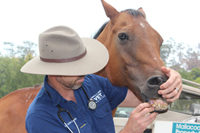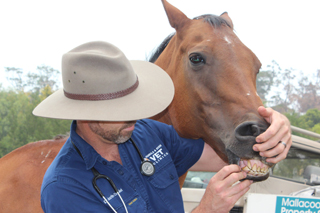
Dr. Justin Daniel 320

Photograph courtesy of Merimbula Veterinary Clinic
Dr. Justin Daniel treats a horse on Jan. 16 in Mallacoota, a fire-hit town in the Australian state of Victoria. The horse was suffering from breathing problems owing to wildfires. Daniel and a colleague, Dr. Nicole Rowley, had spent their day off examining Mallacoota's companion animals, horses and cattle free of charge.
Having just weathered a three-year drought, catastrophic wildfires and the odd flash flood, you'd think the last thing Australian veterinarians could stand right now was a heavy dose of pestilence.
They're getting just that in the form of the COVID-19 crisis, which is ravaging the Australian economy more severely than the now-infamous wildfires that hit around Christmas. Millions of Australian workers have been laid off or forced onto furlough schemes by lockdowns designed to curb the spread of the highly contagious disease caused by SARS-CoV-2, a novel coronavirus. So far, the Australian federal government has spent more than AU$200 billion (US$132 billion) on its COVID-19 response.
But in a twist that few in the veterinary community might have dared expect, the pandemic has brought a boon to some towns worst affected by the wildfire disaster.
"It's actually busier than it was this time last year because of the virus," said Dr. Peter Alexander, when asked by the VIN News Service how the Bega and Cobargo Veterinary Hospitals in southeastern Australia's Bega Valley are faring.
Alexander doesn't know exactly why the pandemic is bringing more folks to the doors of the Bega clinic and its associated branch in nearby Cobargo. As reported by VIN News in January, the Bega Valley region was among the worst affected by wildfires that killed at least 34 people and destroyed nearly 6,000 buildings nationwide, including more than 2,700 homes. Alexander suspects the uptick in business has something to do with people stuck in isolation finding they have more time for their pets.
"People are at home and everyone's taking their dogs for a walk," he said by telephone. "They're watching their animals and they're looking for something to do. So if it's due for a vaccination, they take it. If it coughs the wrong way, they think: 'Strike! I better go to the vet!' "
Alexander stressed that this is his experience only, though he heard the same from a veterinarian friend in Canberra. "He told me it was flat chat in Canberra. Flat chat."
("Flat chat" is Aussie slang for going at maximum capability or speed.)
That the COVID-19 crisis could result in more Australians visiting veterinarians isn't entirely surprising. The economic fallout has caused financial pain to many families, some of whom lost their homes to fire. But COVID-19 has not infected nearly as many people in Australia as in other countries. At last count by local authorities, 7,139 Australians had been infected with the disease and 103 had died.
By comparison, the United States — which leads the world in novel coronavirus confirmed infections and deaths — has tallied more than 1.68 million cases and more than 99,000 deaths, according to a count kept by a Johns Hopkins University team. The United States is much bigger, of course, with a population about 13 times that of Australia. But its deaths and case count are hundreds of times that of Australia's. The United Kingdom, with about 2½ times the population of Australia, likewise has experienced disproportionate effects, logging more than 268,500 cases (37 times Australia's) and more than 37,500 deaths (364 times Australia's).
Consequently, lockdown measures Down Under, while tough, haven't been so tough as to prevent visits to veterinarians, or dissuade clinics from carrying out elective procedures, so long as physical-distancing protocols are observed. Alexander said no members of the public have set foot inside the Bega and Cobargo clinics since March. Instead, they've been happy to hand over their pets at the door and wait in their cars during exams.
Another veterinarian contacted by VIN News, Dr. Justin Daniel, is equally well-placed to gauge how the COVID-19 crisis is affecting fire-ravaged towns. Daniel heads up three practices, located in Merimbula, Eden and Mallacoota — places all hit hard by fire. He, too, reports good news.
"After having a couple of months of severely decreased numbers of people coming to the clinic during the bushfires, with COVID, we've actually seen a little bit of an upsurge in veterinary attendance," Daniel said by telephone.
It's hard to determine, he said, whether the increase is driven by fire-affected people having time to get their lives somewhat back on track, or people paying more attention to their pets during lockdown.
Daniel suspects another element may be at play. "I was a kid when Australia last experienced a recession in the '80s, and doing work experience at my local vet clinic at Port Augusta, South Australia, which is a pretty poor town," he explained. "The vets there said when times are rough, they actually got busier because people had a much greater dependence on their pets for emotional support."
Tourists welcome ... but perhaps not yet
To be sure, it all hasn't been smooth sailing for Daniel, Alexander or many other veterinarians in Australia still trying to recover financially or emotionally from one of the country's worst-ever natural disasters. About 100 clinics across the country suffered severely, from either partial fire damage or power loss, according to the Australian Veterinary Association, the industry's chief lobby group Down Under.
Hundreds more had to cope with a precipitous drop in revenue linked to holidaymakers shunning small tourist towns while fires raged and arterial roads were closed. The COVID-19 pandemic, which has triggered travel restrictions in Australia, has extended that holidaymaker drought, making towns more dependent on tourists particularly vulnerable.
Merimbula, for instance, is home to loads of hotels, restaurants and gift shops that service the scores of tourists that regularly flock to its beaches, often with their pets in tow. The Merimubla Veterinary Clinic is missing them, according to Daniel, who said all three of the clinics he oversees suffered substantially during the fires.
He recalls them running with as little as 30% of their staff and being forced to conduct only emergency work while blazes persisted from late December until mid-February. "And a huge amount of people locally, particularly if you look at the area south of Eden, have lost properties and houses," he said. "They are in a pretty bad way financially, as a result, and that's had a knock-on effect on our business, in addition to decreased tourist throughput."
Although Daniel would like to see the tourists return, he's wary of a second wave of infections emerging, forcing tighter lockdowns. "I would much rather see people not engage in interstate travel until the virus is better contained, to let us be free of COVID locally," he said.
In recent days, Australian federal and some state politicians have indicated that intrastate and interstate travel restrictions could be relaxed in the coming weeks and months. There has even been talk of a "travel bubble" being created with New Zealand, which also has had a relatively low number of COVID-19 cases.
Alexander, meanwhile, notes that Bega, with a population of 4,000 or so, is perhaps fortunate to be more "working town" than pure tourist destination, thanks in part to its dairy sector. Featuring rolling green pastures that attract many visitors, Bega also is home to a large hospital, police station, farm supply stores, electronics stores and car dealerships. Combine that steady hum of economic activity with the extra work needed to treat cattle during the wildfires, plus some assistance from charities, and the Bega and Cobargo clinics withstood the disaster, Alexander said.
Alexander particularly is relieved that the Cobargo clinic, which was without power for about two weeks during the fires, wasn't burned down, given the glacial pace of Australia's mammoth wildfire recovery efforts. Government-backed workers started demolishing wreckage in Cobargo just this month. Some of the destroyed businesses were just a few doors down from the Cobargo clinic.
Wildlife recovery efforts plow ahead
National recovery efforts also have included assessing harm to native flora and fauna. At least one billion animals are thought to have perished in the fires, including endangered or threatened species, such as the koala.
Australia's Department of Agriculture, Water and the Environment told VIN News that addressing the loss of wildlife and habitats "remains a priority focus," even during COVID-19 lockdowns. To the relief of conservation groups, the federal government this month unveiled another AU$150 million (US$99 million) of funding for wildlife recovery efforts, on top of an initial AU$50 million (US$33 million) package announced in January.
"The unprecedented environmental disaster response will help secure the future of treasured native species, from the koala to the Kangaroo Island dunnart and the northern corrobboree frog, as well as unique plants, such as the Wollemi pine, banksias and bottlebrushes," a spokesperson for the department said via email.
Still, she acknowledged that the pandemic has disrupted those efforts, forcing some work to be modified in accordance with health advice that has included travel restrictions to protect small towns with limited health-care capabilities. "Logistics are complex, and precautions are being taken to ensure that field workers are maintaining physical distance, for example, by traveling in separate vehicles," the spokesperson said. "Face-to-face workshops, training activities or field trips involving the public, such as volunteer tree planting, are not able to take place at this time."
Work has included treatment, rehabilitation, transfer and reintroduction of native wildlife into suitable environments. Funding also has gone to zoos, whose veterinarians provide critical care to wildlife and assist with breeding programs to establish "insurance populations" of threatened species.
Dr. Lorenzo Crosta, director of the Avian Reptile and Exotic Pet Hospital in southwestern Sydney, said frontline recovery efforts involving veterinarians have, in many ways, wound down, given the fires ended several months ago.
Crosta said the hospital, which is part of the University of Sydney, ended up tending to fewer animals than expected. "I'm afraid a lot of them died on the spot, or they were so severely affected, they were simply euthanized," he said in a telephone interview.
It is fortunate, Crosta said, that the COVID-19 pandemic hadn't hit earlier, or it would have severely affected fire-recovery efforts. "In a crisis like that, you need people to move around and welcome a lot of volunteers, including from overseas," he said. "We had people coming in from the likes of Europe, China, Japan, the U.S., Brazil, and this would not have been possible during lockdowns."
Among the foreign volunteers that Crosta worked with was Dr. Jamie Peyton, a veterinarian at the University of California, Davis. Peyton is spearheading an innovative treatment for burns using fish skins as bandages.
As it has always done, the Avian Reptile and Exotic Pet Hospital treats injured wildlife, pro bono, every day. Some might be suffering from loss of habitat and food sources resulting from the fire, but how many is unknown.
"It's difficult to say, because nature seems to be recovering so quickly," Crosta said. "I think there were some species that couldn't find a limited food source for maybe two or three weeks, for sure. But now I think it's back almost to normal. It's impressive."